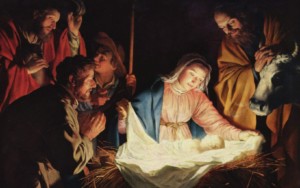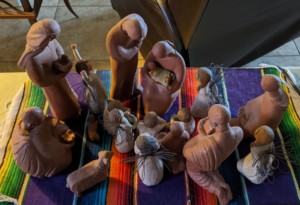Welcome to TOB Tuesdays Refreshed. Over the next few months we will revisit Katrina’s past blogs followed by Jack Henz’* reflection.
Christmas is a Wedding! by Katrina J. Zeno, MTS
Welcome to TOB Tuesdays! My name is Katrina Zeno and every week we’ll spend a few minutes reflecting on an aspect of St. John Paul II’s monumental work, Man and Woman He Created Them, otherwise known as the “Theology of the Body.” Today’s topic is, “Christmas is a Wedding!”
 My second-grade teacher, Sr. Mary Francis, burst my childhood bubble when, a few weeks before Christmas, she asked her class of eight-year-olds, “Did Baby Jesus cry?” I shot my hand up and was the first to answer (some things never change…): “No!” I proudly pronounced. “Yes, He did,” she kindly corrected me. “Because He was a human baby similar to us.”
My second-grade teacher, Sr. Mary Francis, burst my childhood bubble when, a few weeks before Christmas, she asked her class of eight-year-olds, “Did Baby Jesus cry?” I shot my hand up and was the first to answer (some things never change…): “No!” I proudly pronounced. “Yes, He did,” she kindly corrected me. “Because He was a human baby similar to us.”
I sat at my little desk stunned, trying to reconfigure the tapes running in my head. Since age 3, every year I had sung all the verses of numerous Christmas carols including “Away in the Manger.” I knew Verse 2 by heart: “The cattle are lowing, the poor Baby wakes. But little Lord Jesus no crying he makes…”
Already as a youngster, my imagination had firmly painted an angelic Baby Jesus, lying in the manger, sweet and mild, with Mary and Joseph piously gazing at Him. All was calm, all was bright. There was no crying. And then Sr. Mary Francis destroyed my naive Nativity Scene and catapulted me into the great Christian adventure of knowing Jesus not only as fully God, but as fully human.
Fast forward four decades and my encounter with St. John Paul II’s encyclical on the Holy Spirit (Dominum et Vivificatem). Written in 1986, it is rarely read or quoted, and yet, it contains some of St. John Paul II’s most elevated Trinitarian theology. I experienced another Sr. Mary-Francis jolt when I read paragraph 50 of this encyclical, which says, “The conception and birth of Jesus Christ are in fact the greatest work accomplished by the Holy Spirit in the history of creation and salvation…” (DV, no. 50).
The tapes running through my 40-something mind were stunned again. If you had asked, “What is the greatest work of the Holy Spirit in the history of humanity?” I would have shot up my hand and immediately answered, “Raising Jesus from the dead!” And you would have kindly corrected me by saying, “No, it was the Incarnation.”
The Incarnation? Why is the conception and birth of Jesus Christ the greatest work of the Holy Spirit in human history? Isn’t raising Jesus from the dead more impressive than a baby in the manger? I momentarily pouted, and then finished reading to the end of the sentence: “[the conception and birth of Jesus Christ are] …the supreme grace – ‘the grace of union’ – source of every other grace…”
The greatest work of the Holy Spirit in the history of humanity is the union of divine nature and human nature in the Incarnation: this is the supreme grace, source of every other grace.
The greatest work of the Holy Spirit in the history of humanity is the union of divine nature and human nature in the Incarnation: this is the supreme grace, source of every other grace. The Incarnation is not an angelic baby sleeping meek and mild, but the dynamic and powerful event of uniting divinity and humanity in the flesh of this Baby. My favorite Byzantine theologian, Archbishop Joseph Raya, offers us another Sr. Mary-Francis moment in his book Abundance of Love where he writes, “God the Father gave a human nature to his Son. The human body is, therefore, the most precious gift God can offer – besides his own Self” (p. 13).
© Katrina J. Zeno, MTS
Jack Henz’ Reflection: An Advent Epiphany
 The turkeys and pumpkin decorations had just been boxed for next year. It was time for a treat – a piece of pumpkin pie warmed just right. Chilled whipped cream covered the pie and a steaming cup of fresh brewed coffee provided the perfect complement.
The turkeys and pumpkin decorations had just been boxed for next year. It was time for a treat – a piece of pumpkin pie warmed just right. Chilled whipped cream covered the pie and a steaming cup of fresh brewed coffee provided the perfect complement.
As I sat down with my culinary treasures, the Nativity set my wife and I bought shortly after we were married caught my eye on a nearby counter. We keep the Nativity set out year-round as a reminder to share daily the Christmas “gifting of love” given to mankind in the birth of Jesus.
Through the years we added small children, representing our three sons, and their guardian angels to the scene. The story of Jesus’ birth and humble beginnings were always on my mind, but I wasn’t prepared for the seismic shock I was about to receive.
I picked up my tablet to read Katrina’s newest blog entry, Christmas is a Wedding, and found my own comfortable and naïve Christmas beliefs being rocked in ways I never imagined. Though I’ve said the Nicene Creed thousands of times, the words “For us men and for our salvation he came down from heaven, and by the Holy Spirit was incarnate of the Virgin Mary, and became man,” were somehow disconnected from my parochial Nativity-scene vision of Jesus’ birth.
Katrina’s quotation from St. John Paul II’s encyclical on the Holy Spirit quickly expanded my Christmas Vision: “The conception and birth of Jesus Christ are in fact the greatest work accomplished by the Holy Spirit in the history of creation and salvation…” Katrina’s words began provoking an unforeseen epiphany: “The Incarnation is not an angelic baby sleeping meek and mild, but the dynamic and powerful event of uniting divinity and humanity in the flesh of this Baby.”
“The Incarnation is not an angelic baby sleeping meek and mild, but the dynamic and powerful event of uniting divinity and humanity in the flesh of this Baby.”
Suddenly, I felt ashamed that our Nativity scene did not include an image of the Holy Spirit. Despite my cradle-Catholic and extensive catechist training, my “Christmas mind-think” immediately focused on the salvation aspects of Jesus’ coming in the flesh. I was thinking ahead to Jesus delivering us from sin as the reason for the season, all the while missing a monumental truth about the Incarnation itself.
As I read Katrina’s blog, I counted eleven personal “ah-ha” moments. While each one could be the focus of this reflection, I chose God’s motive for the Incarnation as a meaningful synthesis of them all. It’s a paradigm-shifting truth that will resonate in my mind, heart, and soul for all time.
In discussing the motivation for the Incarnation of Jesus as fully divine and fully human, Pope Benedict XVI in a homily on Blessed John Duns Scotus said, “…the Incarnation of the Son of God, planned for all eternity by God the Father at the level of love, is the fulfillment of creation …. The Incarnation…is God’s original idea of ultimately uniting with Himself the whole creation, in the Person and Flesh of the Son.” God’s eternal motive for the Incarnation wasn’t the salvation of man from sin, but God’s desire for unitive love with us. (If you are experiencing a seismic shock at this point, I feel your paradigm-shifting pain.)
God’s eternal motive for the Incarnation wasn’t the salvation of man from sin, but God’s desire for unitive love with us.
Katrina’s words summed it up best for me: “Christmas definitively reveals that our human nature was always created with the Incarnation in mind – for a union and communion between God’s spiritual nature and our embodied human nature in the Word made flesh.” What a powerful message to wrap our arms around.
As I read and reflected on Katrina’s blog, my coffee and pie turned cold, the whipped cream melted, and my mind and heart were on fire! As I turned and looked at the Nativity scene, I saw more than Joseph and Mary with the Baby Jesus. I saw the wedding between divinity and humanity in the Incarnation of Jesus. And I began to ponder – I need to add the Holy Spirit to this Nativity scene. Would it be fire, water, wind, cloud, oil, or a dove? I’ll have to reflect on that one. But one thing is for sure – I had just had an Advent epiphany.
©by Jack Henz
We invite you to share your own 2-3 line reflection on our JPII Resource Center Facebook page by clicking here.
*Jack Henz is a retired meteorologist and a graduate of the Diocese of Phoenix ‘s Kino Catechetical Institute. Together with his wife Karen, he is a passionate catechist concerning all things Catholic, especially the Theology of the Body.




